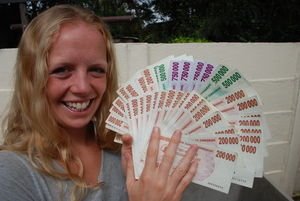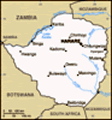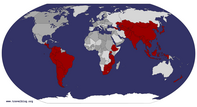Advertisement
Published: February 7th 2008

 12 million Zim Dollars
12 million Zim Dollars
or 6 US Dollars - or 3 Pounds Sterling But first a re-cap
A while back, just after New Year we crossed to the Zimbabwe side of the Victoria Falls. The falls themselves were just as great from this side as the other, but the spray was stronger so the view wasn't as clear. The town of Victoria Falls was a sad sight really. We had prepared ourselves for the situation in Zim and expected to see empty shelves in shops, but what we weren't ready for was the way the whole town was falling apart. While we were there we saw a helicopter doing tours over the falls make an emergency landing with smoke pouring out of the tail, a car break down on the way to a sunset cruise (and by the way it rained constantly for 3 days) and the winch break on a boat while someone was parasailing over crocodile infested waters, leading to the whole trip being cancelled. The problem is that there is a massive brain drain from Zim to neighbouring countries like South Africa and there simply aren't enough mechanics to fix everything!
The situation explained
To put it simply Zimbabwe has no money. We're not just saying the

 We're going to need a bigger pocket
We're going to need a bigger pocket
Dave works out how to fit the evening's spending money in his walletpeople are poor, there is actually no physical cash available. This means several things.
1. The supermarkets are empty of all but the most basic food so while you may be able to buy bread, tomatoes and onions there is virtually no chance of getting your hands on any eggs, fresh fruit or dairy products. If you do come across cheese or meat it is so overpriced that no one can afford to buy it. The other things in the shop are items that are considered too much of a luxury to spend money on like tins of tuna, chocolate bars and cereal. This situation has occurred partly due to the fact most of the farms are not functioning as they used to any more but mostly because of the huge shortage of any foreign currency in the country to buy and import goods. Because the Zim Dollar is worthless outside the country businesses need US Dollars, SA Rand, British Pounds or Botswana Pula or just about any other currency they can get their hands on just to keep trading.
2. Inflation has gone through the roof. While we were there a new 750,000 dollar bill had

 Supermarket Sweep?
Supermarket Sweep?
This is one of the better stocked shops in the 2nd largest city in Zimbabwejust been released and now a 10 million dollar note is on its way. Imagine trying to pay for things in shops in multiples of 750,000 - it messes with your brain! To give you an idea of prices a can of coke costs 3 million, a traditional meal of mealie meal, spinach and meat stew about 4 million and bus tickets anywhere from 10 million upwards. The official government exchange rate is 1USD for 30,000Zim Dollars which is just ridiculous when you consider the black market rate for us was 1USD for 2.3million Zim Dollars and rising every week.
3. There is a thriving, though totally illegal black market. We had no trouble changing money every day with people on the street and even shop keepers. They told us their businesses were going down hill so fast that they had to risk selling Zim money in exchange for dollars so that they can save up in case they have to up and leave overnight. Penalties if they get caught are high which is ironic as it is claimed it is government officials that are helping all the available currency on to the black market for their own profit,

 Queueing for the cash machine
Queueing for the cash machine
A daily chore for most Zimbabweansrather than channeling it through the correct lines so that regular people can get it out of the bank.
4. While supermarkets allow customers to pay via their bank cards people are stuck when it comes to buying material and produce from the markets, buying a bus ticket or paying rent because they simply don't have the cash. This leads to long queues outside banks every single day. Why daily? There is a limit to the amount of money people can take out of their own bank accounts every day and even then machines run out long before the end of the day. We passed people in the line at 4am hoping to be close enough to the front to actually get their daily quota. When we took a photo of the queues we almost got arrested by police officers who materialised out of nowhere and accused us of trying to humiliate Zimbabwe by showing the rest of the world what was happening. We're still not sure if they were genuine police or supporters of Mugabe, but either way it was a bit hairy for a few minutes!
The situation has led to everyday regular people having to resort

 The mood in Zimbabwe
The mood in Zimbabwe
Art reflects life in Zimto almost begging from foreigners and you can see it is highly embarrassing for them. They have also had to develop new ways of getting their hands on cash and while we were there we were approached by several people who could see we had cash (it's hard to hide because of the huge bundles necessary to buy even a packet of rice.) They wanted to pay for our shopping on their bank cards in exchange for our money - a kind of three way cash-back system. We were more than happy to help.
5. There is a huge daily cross border migration of people in search of jobs but also just to buy necessities like cooking oil, soap, coffee and sugar. Our bus from Francistown in Botswana to Bulawayo in Zim was loaded to the rafters with more bags of shopping than you have ever seen in your life . The bus next to us going to Harare had a huge tarpaulin on the roof covering a stack of goods about 2 metres high along the entire length of the bus. The bus companies are making a fortune charging for luggage as well as passengers but people

 If you think the underground is packed
If you think the underground is packed
Licensed to carry 70. Stuffed with around 100 and all their luggage - dead and alive!are prepared to pay because it is the only way. Much of the shopping is for personal use, but there are also the black market stalls in towns selling hugely expensive goods that have been brought over the border. The number of people crossing each day also means HUGE queues at immigration. We queued for an hour to exit Botswana and another hour to enter Zim. Then we had to queue at customs as everyone's bags were checked. We're not entirely sure what happened but the 'innocent' looking woman and baby with a smartly dressed young son were pulled out of the line and marched off to an office after the customs official spotted what we think were several new pairs of shoes that had not been declared. We thought it would hold up our bus while fines etc were paid. Oh no, the bus just left without them and two of the people who'd been standing filled their seats!
Still smiling
Despite all these challenges the people of Zimbabwe were amazing. Shop staff were friendly and smiling even when it took them 5 minutes to count out the vast amount of notes needed for each transaction. Locals

 Clearing the grave
Clearing the grave
Bafu worked without asking what we would pay, then almost cried at the 10 million Zim Dollars (US$4) he received.were helpful and genuinely interested in what we were doing and where we were going and we felt safer than we had felt in many other countries in Africa.
We're not saying this won't change if the situation continues to go down hill, but there seems to be an unwritten rule that because everyone is so poor that it is almost unforgiveable to think of stealing from anyone else because they are in the same situation.
So in Bulawayo we walked around until after dark with no problem at all. We were sad to see many of the cafes and restaurants have closed and just empty shells remain. The Mazda showroom was a vast expanse of windows and floor space with a lonely receptionist sitting behind a desk. No cars to sell and no customers interested in buying anyway. That's the other problem - there is no fuel. Not officially anyway. Petrol stations that do have stock only sell for foreign currency while we saw dozens of pick-ups driving down side streets loaded with barrels of fuel, decanting it direct to people's cars or in to smaller containers like coke bottles. Of course they are charging a fortune

 The Great Enclosure
The Great Enclosure
Home to the Queen. The King's other 199 wives lived in the valley below her.for this black market fuel, so again it is the small man on the street that suffers.
We spent a few days there soaking up the atmosphere and trying to spend money in ways that wouldn't make it to government hands before heading off to Masvingo. We arrived on a Sunday afternoon and quickly realised that the situation here was even worse than in Bulawayo. There was no running water because the chemicals used by cleaning plants had been held up at the border in South Africa and there was no Coca-Cola!! This is an indication of just how bad things have become. Even Coke, with its global marketing that means even tiny villages with no electricity proudly display coca-cola signs in their shop windows, can not manage to keep producing and supplying Coke because of the lack of sugar and fuel!
What did not seem to be in short supply though was beer! All the local men were totally hammered and lying around in the afternoon sun! We managed to find somewhere to stay and headed out to look for Tracey's grandfather's grave. Her mother was born there when it was still called Fort Victoria and her

 The famous tower
The famous tower
No one knows why this solid stone tower was built!grandfather was buried there in 1960. We caused mild amusement when the heavens suddenly opened and we used the run off from a roof to wash our hands and face. It was the only way. We'd already tried the posh hotel as a means of cleaning up after our sticky bus trip to no avail. They had already resorted to scooping water out of the swimming pool just to flush their loos and use for cleaning.
We found the grave and David set about stomping on the head high grasses that had grown up across the whole cemetery. At that point a lovely chap called Bafu passed by and offered to come back the following day with his machete to help us out. He actually did come back the next day and did an amazing job clearing everything up for us. He did it without asking what we were going to pay him and without any kind of pressure to even be paid. His attitude sums up most of the people we met while we were in Zimbabwe and we really hope that the situation changes for the better while they are still managing to live some kind of semblance of normal life. The worrying thing was that everyone we met acknowledged how awful things were but when we suggested things could change with the next election we got comments like "No, Mugabe has his tricks" as they made punching gestures with their hands.
The effect all these problems are having on tourism was obvious when we went to 'Great Zimbabwe' the largest and most important ruins in Africa after the Pyramids. It is a huge, fascinating complex built into the hills and rocks just outside Masvingo and gives the country its name. We were the only people to have visited all day. In the previous week just 15 people had passed through the gates and it is one of the only places we have encountered where prices have gone down compared to those listed in guide books.
After that we headed for Mutare and the border with Mozambique. We left feeling really happy to have helped individuals along the way who all seemed genuinely happy to have visitors in their towns, but sad for a people who are clearly struggling to get by with a smile on their faces that is getting harder to keep every week.
Advertisement
Tot: 0.2s; Tpl: 0.013s; cc: 14; qc: 71; dbt: 0.0854s; 1; m:domysql w:travelblog (10.17.0.13); sld: 1;
; mem: 1.3mb









